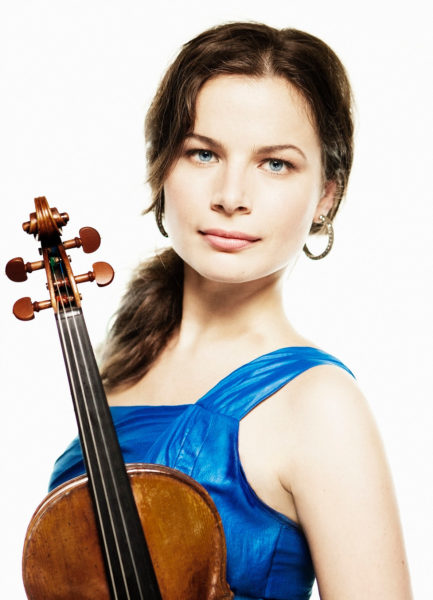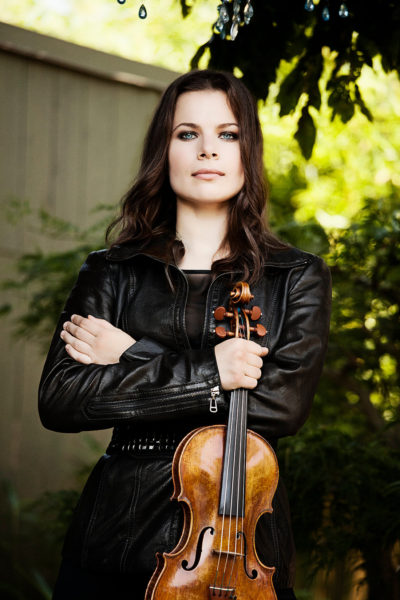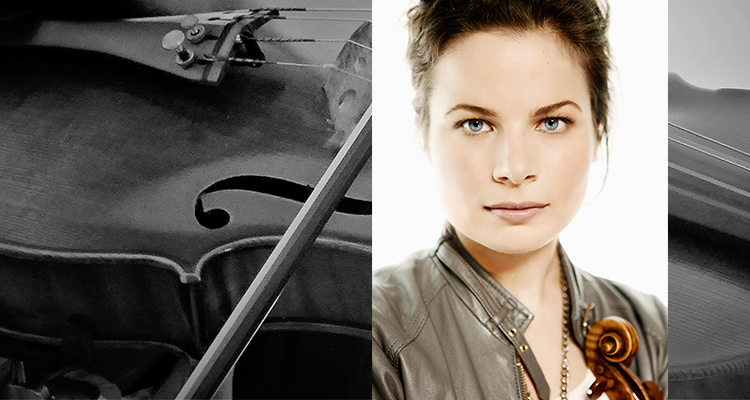“A symphony must be like the world; it must embrace everything.” — Gustav Mahler
Gustav Mahler believed that music should have no bounds, that whatever forces necessary should be marshaled in its realization.

This is just what the Wheeling Symphony Orchestra will do Friday night. Musicians from across the street, across the country and across the globe will gather in The Capitol Theatre to give voice to three cornerstones of the classical repertoire.
I got the chance to correspond with one artist whose path in music has taken her across continents before arriving in Wheeling this week.
Bella Hristova will play the Sibelius Violin Concerto. The plaudits of Ms. Hristova abound. She was awarded an Avery Fisher Career Grant. She attended the Curtis Institute of Music. She has performed all over — across the United States, Asia, even New Zealand. And she graciously answered my questions.
_____________________________
Ryan Norman: Bella, our town and this publication take their name from the Native American words wee lunk, which means something like “place of the head” or “place of the skull.” Can you tell me something about your hometown? You are quite the globetrotter, and I wonder what home means to you now when you travel so much.
Bella Hristova: I was born in Pleven, which is a medium-sized city in Bulgaria. I moved away from Bulgaria when I was 13, so my home now is in Philadelphia. I recently visited Pleven, though, and was struck by how much smaller it seemed now than what I remembered as a 13-year-old. I enjoy being home in Philly and make a point of being home in between concerts. Even though my schedule is always different, I love having a daily routine and being domestic.
Ryan: What is your daily life like?
Bella: I like eating the same thing for breakfast every day, having my coffee, then practicing. In the afternoon, I would work out, write emails or read, and play with the cats, then prepare dinner and watch TV at night. That’s what my ideal day sounds like 🙂
Ryan: When did you begin playing the Sibelius Concerto? How much rehearsal time will you, in fact, have with the conductor and orchestra in Wheeling?
Bella: I first learned the Sibelius Concerto about 15 years ago. I believe I will have two rehearsals in one day in Wheeling, and the concert is the next day. Usually, there aren’t many days of rehearsal with the soloist and orchestra together, but I’m always amazed by how quickly things fall together.
Ryan: It’s tradition that you’re only to refer to Macbeth as The Scottish Play in a theater. And supposedly Beethoven counted out precisely 60 beans for each cup of coffee he drank. Do you have any superstitions or a routine you follow before a performance?
Bella: Did Beethoven really do that? Amazing … he is my absolute favorite composer, and I am thrilled to learn another little quirk about him. I try not to have too exact of a routine because should that be disrupted for whatever reason, I don’t want to feel like I’m unable to perform. But ideally, I will arrive to the hall about an hour early and be able to go through the piece I’m playing once through with the music in front of me, even if I’m playing by memory.
Ryan: I remember the moment when I realized I loved classical music. I was in Cleveland, Ohio, on a dark winter night in my bedroom, listening to a compilation CD that I’d received as a Christmas gift. Sounds of vigor, delicacy and grandeur entered my ears. It was Jupiter from Gustav Holst’s The Planets. I was hooked. What is one of your striking memories of classical music?
Bella: I grew up listening to classical music. My father was a Soviet composer, and my mom conducted choirs. So actually, one of my earliest memories is listening to the Sibelius Violin Concerto on a record player, with David Oistrakh playing. I also listened to my dad’s music, and my mom went to many concerts while she was pregnant with me. Classical music has been a part of my life for as long as I can remember.
Ryan: When I was in seventh grade, my family welcomed a six-week-old Lhasa Apso into our lives. We named him Kashi (not exactly after the cereal), and he’s still with us today. He’ll turn 119 Nov. 1 — or 17 in human years. Do you have any pets?

Bella: Yes, I do have pets. I’m so happy you asked! My husband and I are raising two cats, which we adopted from a shelter six years ago. They are both 6 and 1/2 now, and their names are Uni and Schmoopy. Schmoopy is a big black cat (pushing 18 pounds), and Uni is an eternal kitten — she’s half Schmoopy’s size and a gray tabby. I also grew up with one cat, Masha, and two little dogs, Chara and Susi. I love animals very, very much!
Ryan: Outside of music, what are some of the things that you enjoy, that make your life rich?
Bella: I love reading — currently I’m making my way through the sci-fi book series The Expanse by James S. A. Corey. I enjoy different book genres, but a good sci-fi book can really take over my life for a few days. But I also enjoy things like cooking, bingeing on a TV show (sci-fi), going to Costco, shopping. I like to knit, but only in the winter months.
Ryan: How old were you when you began playing the violin? What drew you to that instrument? Did you ever play anything else?
Bella: I started playing the violin when I was 6 years old. My mother chose it for me — I really wanted to play the piano. I can also play viola and sometimes practice the piano at home.
Ryan: Can you tell me about your violin? How do you travel with it? Does it get its own seat on a plane?
Bella: I play on a 1655 Nicolò Amati violin, which is on a very generous loan to me. It travels right above me in the airplane — in the overhead bin, which is the safest place for it because it can lay flat.
Ryan: What do you aim for in your music-making? Are you trying to honor the spirit of the composer? Do you approach the notes on the page with openness, letting them speak to you, unmoored from preconceptions about what a piece should be?
Bella: I always try to convey what I think the composer wanted, to the best of my abilities. I rarely listen to violin recordings when I’m learning or playing a piece. That way I can be sure the ideas that I have about the piece aren’t influenced by anyone else’s interpretation.
Ryan: Your repertoire encompasses a vast range of history and styles of music. What connects this plethora of pieces?
Bella: I really enjoy playing music written for unaccompanied violin, like the Bach Sonatas and Partitas and Eugène Ysaÿe’s sonatas for solo violin. And I have been commissioning contemporary composers to write for unaccompanied violin as well. It’s when I play unaccompanied violin music that I most feel like the violin is a complete instrument, like the piano (which is my favorite instrument to listen to).
Ryan: I love Mahler’s Second Symphony, Copland’s Appalachian Spring and Shostakovich’s Second Piano Concerto. These works resound within my memory. They remind me of who I was when I first heard them, and who I might be, should I live up to them. What pieces stay with you as a listener?
Bella: Anything by Beethoven, and most so his piano works. The 32 Sonatas and the Diabelli Variations, the Piano Concertos. Also, there are recordings of Rachmaninoff playing his own concerti with the Philadelphia Orchestra that I’ve listened to a lot.
Ryan: Is there anything I should have asked that I didn’t?
Bella: I live in Philly now with my husband, David Serkin Ludwig, who is a composer. He recently wrote me a violin concerto, which was co-commissioned by a consortium of eight different orchestras across the U.S. That has been a very meaningful project for us to do together and to get to travel together for work!
Timothy Hankewich — music director finalist — will conduct the orchestra in Mendelssohn’s Overture to A Midsummer Night’s Dream, Sibelius’ Violin Concerto and Tchaikovsky’s Symphony No. 6, Friday, Oct. 19. Tickets start at $18.50 and can be purchased online, by phone at 304-232-6191, via email at boxoffice@wheelingsymphony.com, or in person at the box office, located at 1025 Main Street, Suite 811, Wheeling.
• Ryan Norman hails from a suburb of Cleveland and earned an English degree at Wheeling Jesuit University. He lives in East Wheeling where you might find him listening to Gustav Mahler or Keith Jarrett, reading David Foster Wallace or Dave Eggers, and thinking along with Martin Heidegger and Roger Scruton. Ryan is also a chorister at St. Matthew’s Episcopal Church and a member of The Prosers, a group that performs original poetry and prose at Towngate Theatre.


